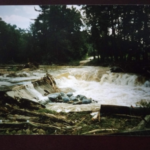Up From Slavery
Up From Slavery
Tucked away in Franklin County is a memorial to the humble roots of a great man. The Booker T. Washington National Monument in Hardy marks the birthplace of a man who inspired a generation of African Americans emerging from the horror of slavery. It also celebrates Booker T. Washington’s own personal journey from slave to statesman.
The National Monument stands on the tract of land (now owned by the National Park Service) on which Booker T. Washington was born into slavery in 1856. Near the foundations of the original 19th century structures, several buildings have been reconstructed as they would have been in Washington’s day. The land, a tobacco farm 160 years ago, is still a small working farm, with a variety of animals and a huge, flourishing garden. Look into the tiny, dark kitchen, much like the place where Booker’s family of four slept on rags on the floor. Walk the grounds and imagine a life working from sunup to sundown to support the plantation (2000 lb of tobacco were produced by slaves on this land in 1860). Imagine living in fear of daily abuse or separation from family, being forcibly prevented from learning or self-improvement, being treated as a piece of property (Booker was valued at $400 on his master’s inventory), and worst of all, imagine having nothing but an entire life of this misery to look forward to.
But by God’s grace, this inhuman practice came to an end when Booker was nine. The Civil War was over, and a Union soldier came to the farm and pronounced the slaves free.
Booker T. Washington would go on to become one of the greatest African American leaders of his era, but life was far from easy for the freed slaves. From Virginia, he moved with his family to West Virginia, where he helped to support his family with hard labor by day while teaching himself to read by night. Later, as a teenager, he walked 500 miles to Hampton, Virginia to enroll in the Hampton Institute for African Americans. His resourcefulness and perseverance were soon noticed; Washington went on to found the Tuskegee Institute in Alabama, and achieve national prominence as a statesman, activist, and political adviser. Washington gained support from some of the leading businessmen of his day (Carnegie, Rockefeller, Rosenwald), and in addition to his establishment of the acclaimed Tuskegee Institute, he became the first African American to meet publicly with a US president at the White House in 1901. Much more work was left to be done when Washington died in 1915, but his leadership and courage paved the way for the accomplishments of many others.
The National Monument is a fascinating, well-kept place, and although the visitor center is closed due to Covid, there is lots to interest the whole family. Our kids enjoyed roaming the grounds, exploring the buildings, and watching the farm animals. Fortuitously, we arrived at the barn just at feeding time, and the park ranger generously let the boys help feed the horses – a dream come true for one of them! The spacious farm also includes a 1.5 mile trail through the woods on the property.
Visit and remember a sober time in our nation’s history – and pray for more leaders with the vision and character of Booker T. Washington.
More from Tim Carr
- Virginia’s Native Allspice

- Wet and Wicked Weather in Western Virginia – Part 3

- Virginia’s Earth-shaking Events

- Roanoke – the Star City Game

- Saving the Planet, one Semi-Immortal Toyota at a time

- Chic(k) Lifestyle – Part 1
- Books to Read Aloud – Caddie Woodlawn

- 5 Random Items We No Longer Want To Do Without





